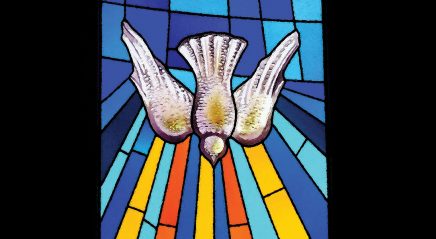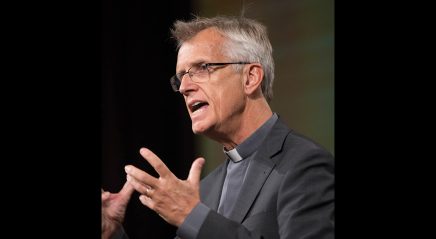Throughout 2015 and 2016, Patricia Cuyatti was immersed in church conflicts across multiple international regions. As Lutheran World Federation (LWF) regional secretary for Latin America, the Caribbean and North America at the time, she accompanied churches dealing with internal challenges and was intensely involved in two primary processes of mediation.
Cuyatti dreamed of empowering people from LWF member churches who could identify signs of crisis and work to prevent their escalation. She shared with colleagues her desire for what she called “good dialogue that could help [people see] each other’s faces while sharing their pain and challenging feelings and [help them] be mutually open to overcoming assumptions, ideas or fears that distance people.”
In 2017, the idea of training leaders on peace-building and mediation became part of the communion-building and church growth programs managed by the LWF’s four regional secretaries. In 2018 and 2019, the LWF held training workshops in Brazil. Cuyatti then began planning a resource that could take the Dialogue for Peaceful Change (DPC) method presented in the trainings and apply it to specific theological and contextual issues to be implemented locally.
Cuyatti dreamed of facilitating “good dialogue that could help [people see] each other’s faces.”
Cuyatti served as editor for the new publication Blessed Are the Peacemakers: Mediation and Reconciliation Skills for the Church (LWF, 2021). She enlisted LWF leaders who had attended the workshops to write chapters for the resource, published in English, Spanish and Portuguese.
In Blessed Are the Peacemakers, scholars and ministers offer their experience of practical approaches to dialogue for change and reconciliation in the church and its communities. Topics covered include biblical visions of equity and inclusion that can help prevent conflict; Christian responsibility for promoting peace; and how to nurture hospitality and welcoming communities.
Cuyatti contributed a chapter and, for the others, sought leaders who “are involved in research, leaders ready to rethink the DPC method from Lutheran and theological perspectives, and [leaders] involved in certain topics like peace-building, migration, ecological matters.”
The gift of peace
James Henricks, pastor of Summer Memorial Lutheran Church in Newberry, S.C., attended the workshops and was asked to write a chapter on migration and how the church can serve as a mediative presence and a mitigator of conflict. “Building on the conflict resolution and mediation training all of the participants received, the idea behind the resource was to take what we had learned, apply it to issues the church around the world is facing and share what we had learned with others in a practical way,” he said.
Through Lutheran Services Carolinas, Henricks and his wife are transitional foster parents for unaccompanied minors who cross the border. “It’s been very meaningful to produce something that might help others have better conversations surrounding migration, so that we can get out of the harmful bickering and really understand our neighbor, their struggles and what it is God is calling us to do as the people of God in this present situation,” he said.
For Henricks, empathetic listening is an area of both study and practice. He received his Master of Theology degree from the University of Helsinki, where he studied in the Religion, Conflict and Dialogue program, and has helped congregations work through their conflicts. “From my research and experience, I’d say being able to deeply listen to someone—even if you disagree—is one of the most powerful things you can do in a conflict,” he said. “It’s a skill anyone can improve with practice.”
“Being able to deeply listen to someone—even if you disagree—is one of the most powerful things you can do in a conflict.”
In his chapter, Henricks lists steps for engaging in empathetic listening, applicable to different dialogue contexts. Speaking about his experience in guiding difficult conversations, he said, “The recognition that we are, together, standing at the foot of the cross and asking what it is Jesus might have to say to us is what I observed led to growth and getting out of our preordained political talking points.”
In providing steps to readers, Henricks hoped to “allow for people who come in with opposing viewpoints to ask the theological question together and discern God’s call. I’ve observed those moments to be very powerful in generating self-reflection and growth.”
Cuyatti believes that in our current global context—the impact of COVID-19, the increase in violence she has seen, and the rise of radicalization in political and social issues—dialogue is more needed than ever. “It is not a simple seating and exchange of ideas,” she said of the kind of dialogue explored in Blessed Are the Peacemakers. “It is to practice living embracing our diversity.”
In order to live out that embrace, she said, “one has to come to know others who are completely different [from oneself] in order to [expand] understanding, to embrace mutually through agreeable actions that can contribute to overcoming fear, pain, loss, grief, etc.”
Cuyatti’s goal for the resource is to “motivate people about the gift of peace.” She hopes it will help readers “to grow and mature while working [through] difficult situations and being enriched through dialogue.”







